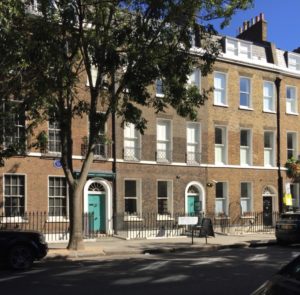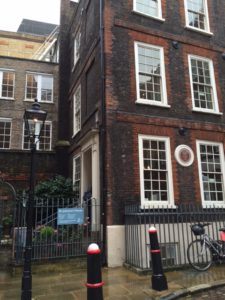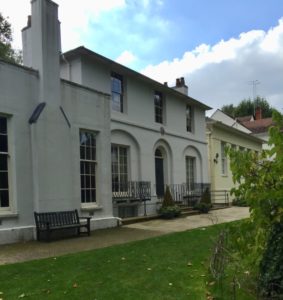We tourists love our large museums, but small museums can be wonderful
It’s Libraries & Museums Month here at Tweetspeak Poetry, and we’re looking at a whole world of art, books, buildings and architecture, artifacts, and the things we place in our cultural institutions.
My wife and I traveled to England five times in the 2010s. We’d been once before, back in 1983. Much had changed; for one thing, the food had vastly improved. And, through all the visits, we did all the sights that you have to do — the Tower, Buckingham Palace, St. Paul’s Cathedral, Westminster Abbey, the British Museum, the Imperial War Museum, the Royal Academy of Arts, Windsor Castle, and all the other places you must visit if you’ve never seen them before.
But a city like London is also filled with small museums, and they tend to be the ones most tourists overlook. Admission is reasonably priced, and guides or docents are quite knowledgeable about the site and the idea or person it’s built around. I have three particular favorites, and I’ve returned to them again and again on succeeding trips.

Dickens House Museum
The Dickens House Museum is located at 48 Doughty Street in Bloomsbury, about a four-block walk from the Russell Square Tube Station and about six blocks from the British Museum. Dickens and his family lived there from 1837 to 1839. It is a narrow townhouse, with four main floors and a basement-level floor. The museum itself includes both the house and the townhouse next door, now used for the entry desk and gift shop.
It’s filled with a considerable amount of Dickens’s own furniture, along with cases of artifacts, like a blacking bottle of the kind that 12-year-old Charles would have pasted labels on and which he included in David Copperfield. You can see a stuffed pet raven – the one that inspired a certain poem by Edgar Allan Poe. And Dickens’s desk is there, or at least one of his desks. You look at that desk in that space, and you realize that it was here that the young author in his 20s finished writing Pickwick Papers, wrote all of Oliver Twist, and began Nicholas Nickleby.
You head south and find your way to Fleet Street. It’s rather surprisingly short, only about two blocks long, but it was these two blocks where Britain’s major newspapers flourished for a long time. You look for an alley on the north side of the street, and you follow its winding ways through small courtyards and bricked pathways, until you reach the Samuel Johnson House.

Samuel Johnson House
It’s a 300-year-old townhouse, located at 17 Gough Square. Johnson lived and worked here, and it was here he compiled his great dictionary. Much of the house has been restored to its original condition; you can see where he ate, entertained, slept, and worked. And you can see what steps Johnson and other homeowners took to prevent burglaries in the days before an organized police force.
During World War II, the house was closed to the public. It was used to provide sleeping and eating quarters for the fire marshals who patrolled during the Blitz of 1940-1941. A considerable amount of the surrounding area was devastated, and the upper floor of the museum even caught fire during one bombing. The fire marshals staying there were able to contain the damage to the top floor.
Then it’s on to near northwest London and my third favorite small museum. The Keats House is located about a block south of Hampstead Heath. In 2015, we signed up for a Keats Walk, which begins near the Hampstead tube station and ends at the Keats House. And the area is filled with Keats stories.

Keats House
The house was built in 1816 as a duplex. Keats and a friend lived on one side of the house, while the Brawne family lived on the other. One of the Brawne daughters, Fanny, became Keats’s fiancée. Five of his six great odes were written here, including Ode to a Nightingale. The tour guide told us that it was here that Keats heard the nightingale, in a tree in the front yard. A sofa faced a window to the front yard, and it was there that the poet, suffering from tuberculosis or what was then called consumption, rested and wrote while he watched Fanny walk in the garden outside.
Small museums don’t attract the large crowds of their larger brethren or the major concerns of government. I worried about all three museums during the COVID shutdown; the Dickens Fellowship, which has a close relationship with the house museum, put out a call for donations during the fall of 2020. But all three seem to have managed their way through (my wife says I helped keep the Dickens House Museum afloat during the shutdown with online gift shop orders).
London has many other small museums — the Garden Museum near Lambeth Palace, the Florence Nightingale Museum, the Benjamin Franklin House, Sir John Soames Museum (with one of the most eclectic collections I’ve seen anywhere), the Sherlock Holmes Museum (which has a better gift shop than museum), and more. The small museums aren’t as well known; tourists often walk right past them on the way to bigger attractions. But they are well worth visiting, they don’t require extended periods of time, and they allow you to go below the surface view you’re forced to get at the big museums and galleries. And you get to see where some of the most famous works in English literature were written.
Photo by cloud-shepherd, Creative Commons, via Flickr. Post by Glynn Young.
How to Read a Poem uses images like the mouse, the hive, the switch (from the Billy Collins poem)—to guide readers into new ways of understanding poems. Anthology included.
“I require all our incoming poetry students—in the MFA I direct—to buy and read this book.”
—Jeanetta Calhoun Mish
- Poets and Poems: Donna Vorreyer and “Unrivered” - October 7, 2025
- Poet Sidney Lanier and the Lost Cause - October 2, 2025
- Poets and Poems: A.J. Thibault and “We Lack a Word” - September 30, 2025


L.L. Barkat says
Oh, wow. I LOVE this post!!!!
And now I want to go visit all those small museums. Maybe especially with my older daughter. (I will need to leave my younger daughter at Harrod’s, where she can do tea while her sister and I “small musuem.” 😉 )
Glynn says
In its own way, Harrod’s is a museum, too, but a quite large one.
Bethany says
Oh my goodness, Libraries & Museum Month?! What a thrill; I adore these places. <3
Two days ago, my daughter and I went to the Schack Art Center and enjoyed it. Next outing, I want to go visit the smallish Museum of Northwest Art again. 🙂
I love the details of the objects you share. They tell a story, don't they? (Or inspire one!) Wish I could go visit them! Thanks for taking us there.
Bethany R. says
I feel so happy in libraries and bookstores too. Sometimes, they can have a museum-effect on me. All those discoveries, stories, and history caught up in tangible (and intangible) objects.
Glynn says
Last month, we visited the Missouri Civil War Museum here in St. Louis. A friend had said it was well worth a visit, and he turned out to be understating the case. It was really enjoyable and informative. It’s adjacent to the Jefferson Barracks National Cemetery and operates exclusively as a non-profit, with no tax dollars involved. I’ve found that most small museums are non-profits like that.
Katie Spivey Brewster says
Thank you, Glynn for this tour of the author houses. The museums you mentioned in your closing paragraph would definitely be ones I’d want to visit. You’ve certainly whet my appetite for an off the beaten path London trip.
Glynn says
Thanks, Katie. I didn’t mention the Handel House Museum, where he composed “The Messiah.” They even do small concerts of his music. Or the Benjamin Franklin House near Charing Cross Station. The Old Operating Theatre Museum (as in surgical operations) is near London Bridge. I also like going in the basement of the Guildhall and looking at the excavations of the Roman amphitheater.